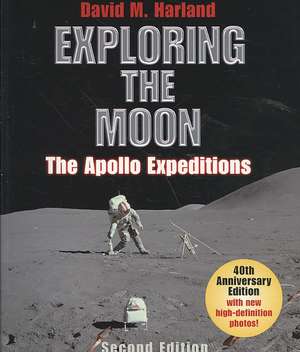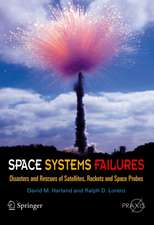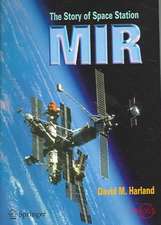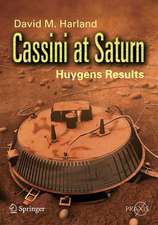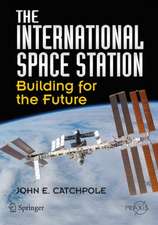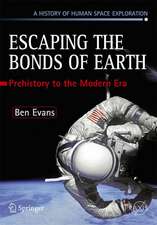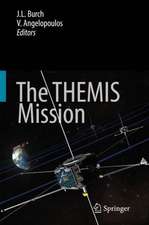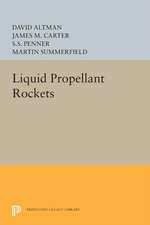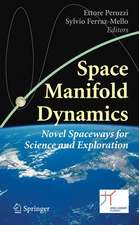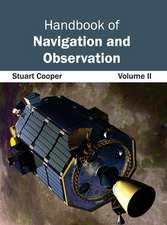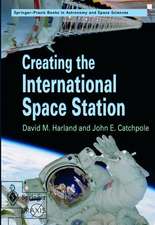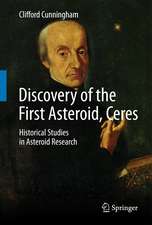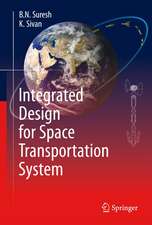Exploring the Moon: The Apollo Expeditions: Springer Praxis Books
Autor David M. Harlanden Limba Engleză Paperback – 11 mar 2008
Din seria Springer Praxis Books
-
 Preț: 294.46 lei
Preț: 294.46 lei -
 Preț: 223.45 lei
Preț: 223.45 lei -
 Preț: 193.12 lei
Preț: 193.12 lei -
 Preț: 167.85 lei
Preț: 167.85 lei -
 Preț: 288.98 lei
Preț: 288.98 lei -
 Preț: 323.74 lei
Preț: 323.74 lei -
 Preț: 401.38 lei
Preț: 401.38 lei -
 Preț: 264.12 lei
Preț: 264.12 lei - 8%
 Preț: 513.00 lei
Preț: 513.00 lei -
 Preț: 190.01 lei
Preț: 190.01 lei -
 Preț: 218.16 lei
Preț: 218.16 lei -
 Preț: 312.06 lei
Preț: 312.06 lei - 17%
 Preț: 414.04 lei
Preț: 414.04 lei -
 Preț: 216.41 lei
Preț: 216.41 lei -
 Preț: 262.27 lei
Preț: 262.27 lei -
 Preț: 264.35 lei
Preț: 264.35 lei -
 Preț: 167.63 lei
Preț: 167.63 lei -
 Preț: 284.81 lei
Preț: 284.81 lei -
 Preț: 259.08 lei
Preț: 259.08 lei -
 Preț: 305.47 lei
Preț: 305.47 lei -
 Preț: 244.14 lei
Preț: 244.14 lei -
 Preț: 227.85 lei
Preț: 227.85 lei -
 Preț: 285.25 lei
Preț: 285.25 lei -
 Preț: 295.56 lei
Preț: 295.56 lei -
 Preț: 357.17 lei
Preț: 357.17 lei -
 Preț: 275.79 lei
Preț: 275.79 lei -
 Preț: 257.08 lei
Preț: 257.08 lei -
 Preț: 349.71 lei
Preț: 349.71 lei -
 Preț: 272.45 lei
Preț: 272.45 lei -
 Preț: 270.27 lei
Preț: 270.27 lei - 8%
 Preț: 456.51 lei
Preț: 456.51 lei -
 Preț: 352.34 lei
Preț: 352.34 lei - 8%
 Preț: 394.80 lei
Preț: 394.80 lei -
 Preț: 325.29 lei
Preț: 325.29 lei -
 Preț: 253.11 lei
Preț: 253.11 lei -
 Preț: 192.86 lei
Preț: 192.86 lei -
 Preț: 313.40 lei
Preț: 313.40 lei -
 Preț: 150.51 lei
Preț: 150.51 lei -
 Preț: 233.34 lei
Preț: 233.34 lei -
 Preț: 286.78 lei
Preț: 286.78 lei -
 Preț: 212.01 lei
Preț: 212.01 lei -
 Preț: 366.83 lei
Preț: 366.83 lei -
 Preț: 299.99 lei
Preț: 299.99 lei -
 Preț: 232.27 lei
Preț: 232.27 lei -
 Preț: 284.58 lei
Preț: 284.58 lei -
 Preț: 212.45 lei
Preț: 212.45 lei -
 Preț: 159.81 lei
Preț: 159.81 lei -
 Preț: 349.48 lei
Preț: 349.48 lei - 20%
 Preț: 2061.61 lei
Preț: 2061.61 lei
Preț: 320.65 lei
Nou
Puncte Express: 481
Preț estimativ în valută:
61.35€ • 64.06$ • 50.78£
61.35€ • 64.06$ • 50.78£
Carte disponibilă
Livrare economică 14-28 martie
Preluare comenzi: 021 569.72.76
Specificații
ISBN-13: 9780387746388
ISBN-10: 0387746382
Pagini: 403
Ilustrații: XXIV, 404 p. 176 illus., 16 illus. in color.
Dimensiuni: 210 x 279 x 24 mm
Greutate: 1.29 kg
Ediția:2nd ed. 2008
Editura: Springer
Colecția Praxis
Seriile Springer Praxis Books, Space Exploration
Locul publicării:New York, NY, United States
ISBN-10: 0387746382
Pagini: 403
Ilustrații: XXIV, 404 p. 176 illus., 16 illus. in color.
Dimensiuni: 210 x 279 x 24 mm
Greutate: 1.29 kg
Ediția:2nd ed. 2008
Editura: Springer
Colecția Praxis
Seriile Springer Praxis Books, Space Exploration
Locul publicării:New York, NY, United States
Public țintă
Popular/generalCuprins
List of illustrations.- List of tables.- List of acronyms.- Foreword by Harrison Schmitt .- Author’s Preface.- Acknowledgements.- The Apollo challenge.- The robots.- Magnificent desolation.- ‘Pin-point’ target.- Knowledge from the Moon.- The wonder of the unknown at Hadley-Apennine.- Surprise at Descartes-Cayley.- The beautiful valley of Taurus-Littrow.- Luna revival.- Apollo in context.- Spaceflight log.- Lunar landing sites.- Apollo missions, facts and figures.- Apollo lunar samples.- Chronological bibliography.- Index.
Recenzii
From the reviews of the first edition -
"A detailed guide to what the astronauts did during their stays on the lunar surface. Walk(s) the reader through the prospecting excursions and then incorporate(s) decades of subsequent analysis to put the explorations of dust, rocks, craters, and rilles into geologic context." SKY & TELESCOPE
"EXPLORING THE MOON is very well illustrated…All aficionados of the Apollo program will find much to appreciate in [this book].
"…this is an interesting account of one of the most extraordinary decades in history…a very different book. David Harland probably knows more about the nuts and bolts of the Russian and American space programs than any other author and it shows.”LUNAR & PLANETARY INFORMATION BULLETIN
From the reviews of the second edition:
"David Harland’s book is an honourable addition to the ranks. Exploring the Moon – The Apollo Expeditions is packed with photos, and features a historically detailed text backed by a thorough index. … If you want to know the exact order in which NASA’s Apollo astronauts surveyed particular zones of their landing sites, or which craters delivered the most interesting scientific clues about the origins of the Moon, then this is the book for you. … a fantastic resource for fans of the Apollo era." (Piers Bizony, BBC Sky at Night, July, 2008)
"A wealth of knowledge regarding the early days of manned space exploration. … Its high resolution photography brings a surface that few have seen before into crystal clarity." (James M. Busby, Space Times, Vol. 47 (3), 2008)
"A detailed guide to what the astronauts did during their stays on the lunar surface. Walk(s) the reader through the prospecting excursions and then incorporate(s) decades of subsequent analysis to put the explorations of dust, rocks, craters, and rilles into geologic context." SKY & TELESCOPE
"EXPLORING THE MOON is very well illustrated…All aficionados of the Apollo program will find much to appreciate in [this book].
"…this is an interesting account of one of the most extraordinary decades in history…a very different book. David Harland probably knows more about the nuts and bolts of the Russian and American space programs than any other author and it shows.”LUNAR & PLANETARY INFORMATION BULLETIN
From the reviews of the second edition:
"David Harland’s book is an honourable addition to the ranks. Exploring the Moon – The Apollo Expeditions is packed with photos, and features a historically detailed text backed by a thorough index. … If you want to know the exact order in which NASA’s Apollo astronauts surveyed particular zones of their landing sites, or which craters delivered the most interesting scientific clues about the origins of the Moon, then this is the book for you. … a fantastic resource for fans of the Apollo era." (Piers Bizony, BBC Sky at Night, July, 2008)
"A wealth of knowledge regarding the early days of manned space exploration. … Its high resolution photography brings a surface that few have seen before into crystal clarity." (James M. Busby, Space Times, Vol. 47 (3), 2008)
Textul de pe ultima copertă
David Harland opens with a review of the robotic probes, namely the Rangers which returned television before crashing into the Moon, the Surveyors which 'soft landed' in order to investigate the nature of the surface, and the Lunar Orbiters which mapped prospective Apollo landing sites. He then outlines the historic landing by Apollo 11 in terms of what was discovered, and how over the next several missions the program was progressively geared up to enable the final three missions each to spend three days on comprehensive geological investigations. He concludes with a review of the robotic spacecraft that made remote-sensing observations of the Moon. Although aimed at the enthusiast, and can be read as an adventure in exploration, the book develops the scientific theme of lunar geology, and therefore will be of use as background reading for undergraduate students of planetary sciences. In addition, with the prospect of a resumption of human missions, it will help journalists understand what Apollo achieved after the 'flags and footprints' of the Apollo 11 landing in July1969 and will commemorate the fortieth anniversary of that momentous event.
Highlighted as a "Commemorative Edition" on the cover, this second edition has a new foreword by one of the original astronauts and a short extra section at the end previewing the prospect of a renewal of human exploration of the Moon. It will include new extra high quality graphics which are only now available and 32 pages of colour illustrations.
From the reviews of the first edition -
"A detailed guide to what the astronauts did during their stays on the lunar surface. Walk(s) the reader through the prospecting excursions and then incorporate(s) decades of subsequent analysis to put the explorations of dust, rocks, craters, and rilles into geologic context." SKY & TELESCOPE
"EXPLORING THE MOON is very well illustrated…All aficionados of the Apolloprogram will find much to appreciate in [this book].
"…this is an interesting account of one of the most extraordinary decades in history…a very different book. David Harland probably knows more about the nuts and bolts of the Russian and American space programs than any other author and it shows.”LUNAR & PLANETARY INFORMATION BULLETIN
Highlighted as a "Commemorative Edition" on the cover, this second edition has a new foreword by one of the original astronauts and a short extra section at the end previewing the prospect of a renewal of human exploration of the Moon. It will include new extra high quality graphics which are only now available and 32 pages of colour illustrations.
From the reviews of the first edition -
"A detailed guide to what the astronauts did during their stays on the lunar surface. Walk(s) the reader through the prospecting excursions and then incorporate(s) decades of subsequent analysis to put the explorations of dust, rocks, craters, and rilles into geologic context." SKY & TELESCOPE
"EXPLORING THE MOON is very well illustrated…All aficionados of the Apolloprogram will find much to appreciate in [this book].
"…this is an interesting account of one of the most extraordinary decades in history…a very different book. David Harland probably knows more about the nuts and bolts of the Russian and American space programs than any other author and it shows.”LUNAR & PLANETARY INFORMATION BULLETIN
Caracteristici
Computer enhanced graphics update the already successful first edition Timed to commemorate the fortieth anniversary of the Apollo 11 landing Recalls original transcripts and uniquely presents the lunar surface missions as travelogues Explains how the landing sites were selected, and what was discovered post-missions Includes a comprehensive glossary of geological terminology
